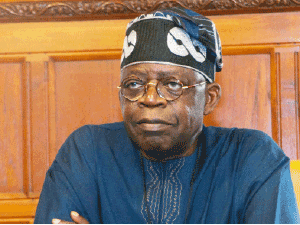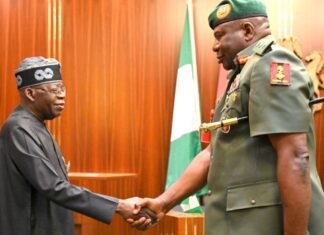Assistant Politics Editor, DANIEL KANU, looks at Lagos politics in the 2015 governorship contest between APC and PDP.
With the emergence of Jimi Agbaje as the governorship flag-bearer of the Peoples Democratic Party (PDP) and Akinwunmi Ambode as that of All Progressives Congress (APC), a tough battle is envisaged in Lagos State.
In fact, ahead the real contest, the battle is already being dubbed “mini war’’ by analysts.
This is especially as the state is regarded as microcosm of Nigeria with virtually every culture, tradition, religion as well as the socio-political systems of the components of the country manifested in it one way or another.
Agbaje, in clinching PDP ticket, scored 434 votes to defeat four other candidates including former Minister of State for Defence, Senator Musiliu Obanikoro, despite joining the party barely some months.
He is however not new in politics. He was for instance, gubernatorial candidate of the Democratic Peoples Alliance (DPA), in 2007 and was reputed to have perhaps run the most vibrant campaign. Above all, he is believed to have discharged himself equitably in the court of public opinion.
Agbaje, a renowned pharmacist has the political finesse, intellect and highly organised with massive admirers among Lagosians, a reason many believe he was drafted to the party to give APC a run for their money.
From day one, Agbaje enjoyed full support of the party leadership and it was not surprising he emerged as the party candidate.
Most Lagosians who have felt aggrieved on some of the policies of the APC government in Lagos state say the time has come for a payback as they promised to vote out the party in the next poll.
Some, who allege that some of Governor Babatunde Fashola’s policies are anti-poor and targeted against the non-indigenes, vowed that they would vote out the APC come 2015.
Many also see the electoral battle as a fight between the establishment and a new order with a paradigm shift.
Flying the flag of PDP, a party in control at the national level, Agbaje is also said to have a coverage as he would not be intimidated by the state apparatus.
Ambode’s credentials are also very intimidating. He is a public finance expert, former Accountant-General of Lagos and retired civil servant who served the state for 27 years; holding key positions across all cadres of the state’s civil service such as the Auditor General for Local Governments and Permanent Secretary.
After his retirement from the civil service at 49, he established Brandsmiths Consulting Limited – a public finance and management-consulting firm with a deep knowledge of the Nigerian public sector.
At 21, he was already a graduate with Honours in Accounting from the University of Lagos (UNILAG) and at 24, he had become a member of the Institute of Chartered Accountants of Nigeria (ICAN), finishing a master’s degree in Accounting specialising in Financial Management, via a federal government scholarship. He says he is passionate about the development of Lagos.
By all standards, none of the candidate is a push-over.
Ambode 51, won the election which was held on December 4, which had about 3,000 APC delegates in attendance.
He had to go head to head with other aspirants such as former Attorney-General of the state, Olasupo Shasore, who reportedly had the support of Governor Babatunde Fashola, and the Speaker of the House of Assembly, Adeyemi Ikuforiji, among others.
Since the return of the democratic dispensation in 1999, only a particular party transmuting into different parties has held sway in Lagos.
For instance, Senator Bola Tinubu rode on the crest of the pro-June 12 struggles and advocacy to become the governor on the platform of Alliance for Democracy (AD).
He administered the state for two terms spanning eight years and was able to pass the baton effortlessly to his former Chief of Staff, Fashola, a Senior Advocate of Nigeria (SAN).
Although Fashola won on the platform of the Action Congress (AC) and would be serving out his last tenure, the political party has remained the same despite change of party name, now APC.
In theory, the ruling party in Lagos is supposed and expected to retain its stranglehold without any major challenge from the opposition PDP, but analysts are of the opinion that the tide may change as the election is not going to be that simple.
The party appears currently as a house divided against itself and may collapse if care is not taken. Tinubu, national leader of the party, is believed in many quarters to have imposed Ambode on the party, and in the process, provoking unusual dissension in its fold.
Our reporter reliably gathered that some aggrieved contestants that lost have vowed to work against the interest of the party, unless some issues are resolved.
At a time, the APC National Legal Adviser, Muiz Banire, boldly came out to warn about the danger the issue of imposition poses to the good health of the party. Banire was merely echoing the loud whispers from behind the scene of those who have expressed disenchantment.
What is playing out is that the hard-core politicians among the party seem to be raising dust underground, insisting that Ambode is at the very best a bystander, if not an outsider who wants to reap where he did not sow.
Lagos politicians, including APC members, appear bent to demystify Tinubu as the ultimate powerhouse in the state and this may negatively affect Ambode’s chances of victory.
Some observers are of the view that since the influence of Tinubu’s fabled war chest could not save Ondo and Ekiti states, it may not have influence among very critical Lagos voters.
For Ambode, his biggest strength is also his greatest weakness and that is Tinubu. He is a fantastic gentleman with exciting credentials, but critics are of the view he must make extra effort to pacify those who see him as a mere stooge of the former governor.
In all, observers agree that the contest will be too close to call, and, unlike in previous elections, Agbaje may likely make a difference by posting a surprise.














